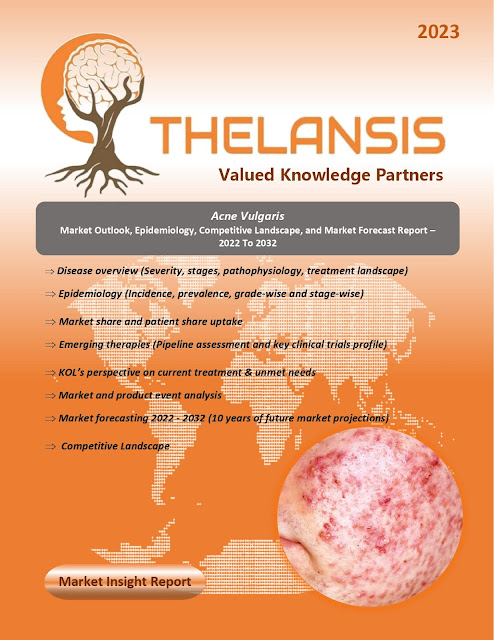Dry Eye Disease (DED) – Market Outlook, Epidemiology, Competitive Landscape, and Market Forecast Report – 2023 To 2033
Dry eye disease (DED), also referred to as keratoconjunctivitis sicca, is a prevalent and persistent condition affecting the ocular surface. It is characterized by an inability to produce an adequate quantity or quality of tears to moisturize the eyes. Several common risk factors contribute to this syndrome, including aging, being female, exposure to low-humidity environments, using certain systemic medications, and autoimmune disorders. DED is categorized into two main types: "dry eye with reduced tear production," referred to as aqueous deficient, and "dry eye with increased tear film evaporation," known as the hyper-evaporative type. Among those affected, about 10% suffer from aqueous deficient DED, while more than 80% experience the hyper-evaporative type, often related to meibomian gland dysfunction (MGD) or a combination of both. The consequences of DED can be substantial, significantly impacting one's vision and overall quality of life. The associated symptoms often interfere with everyday tasks such as writing, reading, or working on video display monitors. Consequently, the primary objectives of DED treatment are to alleviate ocular discomfort, enhance the patient's quality of life, and restore the ocular surface and tear film to their natural states, preventing any further harm to the eye tissue and cornea. Various pharmacological therapies are available as part of the treatment arsenal.
·
The prevalence of DED in the general
population stands at 5.28%. The condition is more prevalent among females,
affecting 7.78%, compared to 2.96% among males. Furthermore, DED becomes more
common with age, with a rate of 0.20% among those aged 2-17 years, increasing
significantly to 11.66% for individuals aged 50 years or older.
·
The annual prevalence rates show an upward
trend, rising from 0.8% to 3.0% overall, from 1.4% to 4.5% in females, and from
0.3% to 1.6% in males.
Thelansis’s
“Dry Eye Disease (DED) Market Outlook, Epidemiology, Competitive Landscape, and
Market Forecast Report – 2023 To 2033" covers disease overview,
epidemiology, drug utilization, prescription share analysis, competitive
landscape, clinical practice, regulatory landscape, patient share, market
uptake, market forecast, and key market insights under the potential Dry Eye
Disease (DED) treatment modalities options for eight major markets (USA,
Germany, France, Italy, Spain, UK, Japan, and China).
KOLs insights of Dry Eye Disease (DED)
across 8 MM market from the centre of Excellence/ Public/ Private hospitals
participated in the study. Insights around current treatment landscape,
epidemiology, clinical characteristics, future treatment paradigm, and Unmet
needs.
Dry Eye
Disease (DED) Market Forecast Patient Based Forecast Model (MS. Excel Based
Automated Dashboard), which Data Inputs with sourcing, Market Event, and
Product Event, Country specific Forecast Model, Market uptake and patient share
uptake, Attribute Analysis, Analog Analysis, Disease burden, and pricing
scenario, Summary, and Insights.
Thelansis Competitive Intelligence (CI) practice
has been established based on a deep understanding of the pharma/biotech
business environment to provide an optimized support system to all levels of
the decision-making process. It enables business leaders in forward-thinking
and proactive decision-making. Thelansis supports scientific and commercial
teams in seamless CI support by creating an AI/ ML-based technology-driven
platform that manages the data flow from primary and secondary sources.
Tags: Dry Eye
Disease (DED), Dry Eye Disease (DED) market outlook, Dry
Eye Disease (DED) competitive landscape, Dry
Eye Disease (DED) market forecast, Thelansis, Primary
market research, KOL insights, Competitive Intelligence (CI)




Comments
Post a Comment